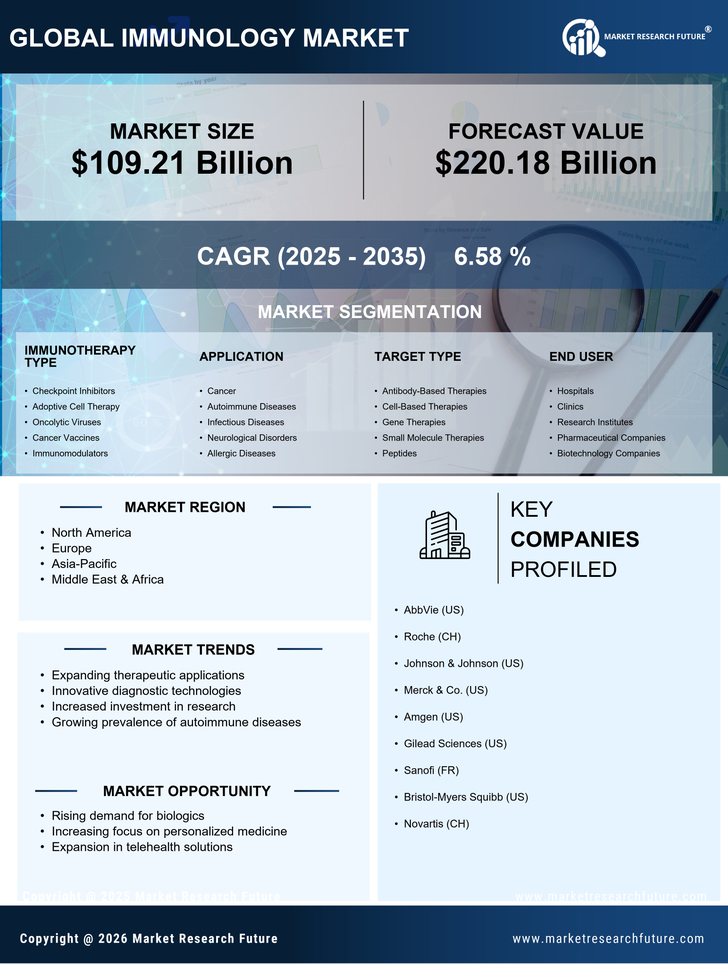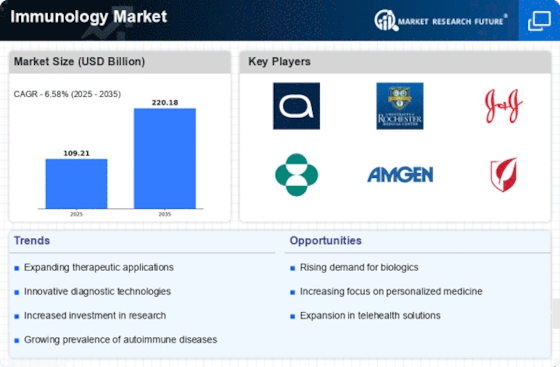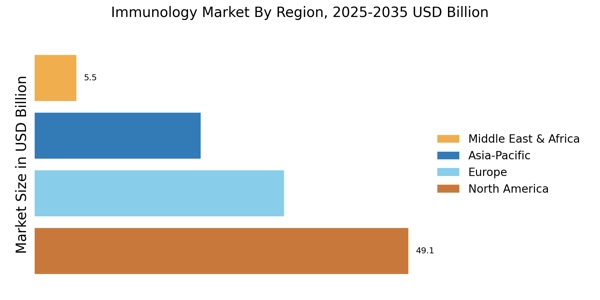Advancements in Immunotherapy
The Immunology Market is witnessing a surge in advancements related to immunotherapy, which is increasingly recognized for its potential in treating various diseases, including cancer and autoimmune disorders. The development of novel immunotherapeutic agents, such as immune checkpoint inhibitors and CAR T-cell therapies, has transformed treatment paradigms. According to recent data, the immunotherapy segment is projected to grow at a compound annual growth rate (CAGR) of approximately 12% over the next five years. This growth is driven by ongoing research and clinical trials that aim to enhance the efficacy and safety profiles of these therapies. As a result, the Immunology Market is likely to expand, attracting significant investments from pharmaceutical companies and research institutions.
Technological Innovations in Diagnostics
Technological advancements in diagnostic tools are significantly influencing the Immunology Market. Innovations such as next-generation sequencing, multiplex assays, and point-of-care testing are enhancing the ability to diagnose immunological disorders accurately and swiftly. These technologies facilitate early detection and personalized treatment approaches, which are becoming increasingly important in managing complex immunological conditions. The market for immunodiagnostics is projected to grow at a CAGR of around 10% in the coming years, driven by the demand for rapid and precise diagnostic solutions. As healthcare providers increasingly adopt these advanced diagnostic tools, the Immunology Market is likely to experience substantial growth, enabling better patient outcomes and more effective treatment strategies.
Growing Prevalence of Autoimmune Diseases
The rising incidence of autoimmune diseases is a critical driver for the Immunology Market. Conditions such as rheumatoid arthritis, lupus, and multiple sclerosis are becoming increasingly prevalent, affecting millions of individuals worldwide. Recent estimates suggest that autoimmune diseases affect approximately 5-8% of the population in various regions. This growing patient population necessitates the development of innovative therapeutic solutions, thereby propelling the demand for immunological treatments. Pharmaceutical companies are focusing on research and development to address these unmet medical needs, which is expected to contribute to the overall growth of the Immunology Market. Furthermore, increased awareness and early diagnosis of these conditions are likely to enhance treatment rates, further stimulating market expansion.
Regulatory Support for Immunological Products
Regulatory agencies are increasingly providing support for the development and approval of immunological products, which is a vital driver for the Immunology Market. Streamlined approval processes and incentives for orphan drugs are encouraging pharmaceutical companies to invest in immunology research. Recent initiatives by regulatory bodies aim to expedite the review of innovative therapies, particularly those addressing serious and life-threatening conditions. This supportive regulatory environment is likely to foster innovation and enhance the availability of new treatments in the market. As a result, the Immunology Market is expected to benefit from a more robust pipeline of immunological products, ultimately improving patient access to cutting-edge therapies.
Increased Investment in Research and Development
Investment in research and development (R&D) within the Immunology Market is on the rise, driven by the need for innovative therapies and solutions. Pharmaceutical companies and biotech firms are allocating substantial resources to explore new immunological pathways and develop novel treatments. Recent data indicates that R&D spending in the biopharmaceutical sector has reached unprecedented levels, with a significant portion directed towards immunology-related research. This trend is expected to continue, as stakeholders recognize the potential for breakthroughs in immunotherapy and personalized medicine. The influx of funding is likely to accelerate the pace of innovation, ultimately benefiting the Immunology Market by introducing new products and therapies that address unmet medical needs.


















